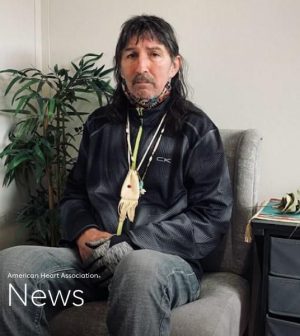- The Best Time of Day to Drink Bone Broth to Maximize Health Benefits
- 8 Ways to Increase Dopamine Naturally
- 7 Best Breads for Maintaining Stable Blood Sugar
- Gelatin vs. Collagen: Which is Best for Skin, Nails, and Joints?
- The Long-Term Effects of Daily Turmeric Supplements on Liver Health
- Could Your Grocery Store Meat Be Causing Recurring UTIs?
- Are You Making This Expensive Thermostat Error This Winter?
- Recognizing the Signs of Hypothyroidism
- 10 Strategies to Overcome Insomnia
- Could Artificial Sweeteners Be Aging the Brain Faster?
AHA News: Native People Find Support, ‘Sacred Space’ Through This Nonprofit’s Work

MONDAY, Aug. 23, 2021 (American Heart Association News) — Unemployed because of the COVID-19 pandemic and with no place to live, Jeff Sari found refuge at a community organization in Seattle that offered more than just a bed and hot meals.
Chief Seattle Club, a nonprofit focused on supporting American Indian and Alaska Native people, was there for Sari after he was diagnosed with colon cancer in November. The staff made sure he arrived at his doctor’s appointments and chemotherapy treatments on time.
He got a job at the organization to help serve breakfast and lunch to the homeless and to do laundry. He attends counseling on Mondays and social gatherings on Wednesdays that “give everyone a chance to sit in a circle and talk,” said Sari, a member of the Sault Ste. Marie Tribe of Chippewa Indians in Michigan.
“Even when you’re down, it’s uplifting,” Sari said. “It just helps to be surrounded with people that care.”
His story exemplifies the mission of Chief Seattle Club as a place that provides a “sacred space to nurture, affirm, and renew the spirit of urban Native people.”
“We’re about healing our community,” said Derrick Belgarde, who became executive director in May but has worked at the organization since 2015. “Revitalizing our spirit, as a culture, as a people – one body, one heart, one mind.”
Founded in 1970, the Chief Seattle Club began a dramatic expansion of services about six years ago to take a more proactive approach to addressing need. For example, among people experiencing homelessness in King County, which includes Seattle, an estimated 15% are Native American and Alaska Native. That’s despite Native Americans and Alaska Natives making up only 1% of the county’s population.
“We fall through the cracks of the nonindigenous (support) systems,” Belgarde said. “We realized that the only way we’re going to stabilize our community is if we take the reins and help ourselves.”
In 2017, the club started Native Works, a booth at Seattle’s Pike Place Market that serves as a job training program for members. The next year, it hired a chef as kitchen manager to serve more traditional food.
Eagle Village opened in 2019 to serve as a transitional housing residence for up to 25 people. In the midst of the pandemic in September 2020, the Chief Seattle Club served a record 9,982 meals.
The organization’s most ambitious project yet is scheduled to be completed in October. The ?ál?al building includes 80 studio apartments for low-income households and will include space for health care and social services. “?ál?al” is a Lushootseed word for “home.” Lushootseed is spoken by Indigenous groups in the Puget Sound area of Washington.
Around the same time, the club is scheduled to break ground on a second supportive housing project that would have 120 units.
“We’re going to keep developing until all of our relatives are safe and have security,” Belgarde said. The Chief Seattle Club recently received funding from the American Heart Association’s Bernard J. Tyson Impact Fund. The fund invests in local, evidence-based efforts to reduce social and economic barriers to health equity.
Belgarde knows well what kind of impact the club can have.
“I suffered from alcohol addiction, found myself on the streets and estranged from my family. It was actually the club that got me the resources I needed through one of our partners,” said Belgarde, who joined as a member more than a decade ago. “It was there that I really decided to straighten out my life.”
For others like Sari, the organization offered an opportunity for stability at a time of financial need. He had been in Seattle last summer to work as a commercial fisherman on a vessel bound for Alaska, but the boat never set sail because of COVID, leaving him without a source of income.
Sari eventually got connected to Eagle Village and the Chief Seattle Club. They’ve been by his side since his cancer diagnosis. And they’ve supported him since his stroke in March. He has mostly recovered except for loss of some feeling in his left hand.
“They’re right there all the way with you. I can’t say that enough,” Sari said. “It’s outstanding.”
American Heart Association News covers heart and brain health. Not all views expressed in this story reflect the official position of the American Heart Association. Copyright is owned or held by the American Heart Association, Inc., and all rights are reserved. If you have questions or comments about this story, please email editor@heart.org.
By Genaro C. Armas
Copyright © 2026 HealthDay. All rights reserved.










